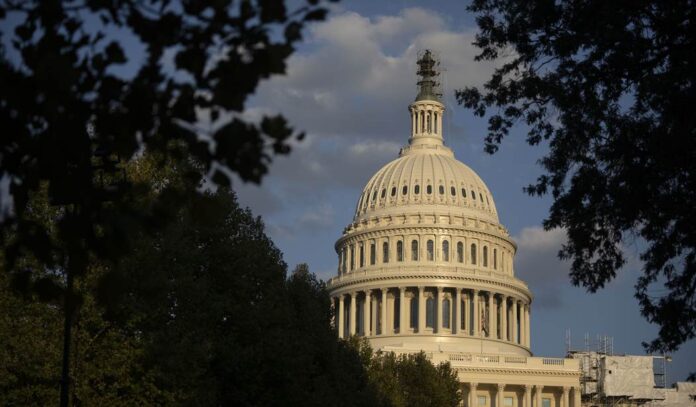North Dakota voters on Tuesday approved a ballot measure that would set age limits for congressional candidates.
The measure would place a ban on individuals running for House or Senate if they would be 81 years old by the end of their term. If an age-prohibited candidate is required to appear on the ballot because of higher laws, the age they will turn by the end of their term will be printed next to their names. It also empowers any elector to enforce the law and requires the attorney general to defend the measure.
The measure passed with 61 percent of voters supporting it and 39 percent opposing. This is the first state to enact such a policy. It is aimed at avoiding problems related to age and cognitive issues among those serving in the legislature.
This development comes amid increased concerns over elderly individuals serving in high positions of authority. Polling has shown that voters are uneasy about the ages of both presidential candidates.
Most Americans believe that someone a bit older, most likely an incumbent office holder, not only brings seniority, but a wealth of experience and knowledge to the office. But the new CBS News/YouGov poll shows that, in an upcoming presidential election, where the likely candidates of both parties are either at or beyond 80 years old, there is also growing concern that the other side of that coin is that those approaching that age may have some health issues, either physical or mental, that could prevent them from doing the job to the fullest extent, or that they might be “out of touch” with the lives of average Americans.
The poll surveyed 2,335 Americans of all backgrounds from September 5-8. Some did say that older politicians had some advantages. When asked about politicians over the age of 75 years, 52 percent said they would be “helpful with committee seniority,” and 68 percent said they “have helpful experience.” But more had concerns. Of those polled, 78 percent said that a politician’s age would “raise concerns about job ability,” and a whopping 80 percent brought up someone that age would “risk being out of touch.”
State Rep. Jared Hendrix, who chairs the measure’s sponsoring committee, told reporters in March that the age of those serving in office is “a very legitimate, serious issue that I think people are going to want to weigh in on.”
When asked if people can still contribute to society after reaching 80 years old, Hendrix said they can, but just not as a member of Congress from North Dakota.
“There’s no question that people at that stage in their life have incredible wisdom and value to offer, and they can continue to offer that in a lot of ways,” said Hendrix, who also is chair of the NDGOP District 10 in Fargo. “On average, that’s just not the case for most people. Most people see a measurable decline, both physically and mentally, around the age of 80 and beyond.”
U.S. Sen. Kevin Cramer (R-ND) opposed the measure, telling the Associated Press, “To limit those decisions arbitrarily just doesn’t make sense to me.”
Currently, there are 19 lawmakers in the legislature who are 80 years old or older. The average age of Congress is much higher than it has been in the past.
Don’t expect such unfamiliarity to change anytime soon: As it turns out, Congress today is older than it’s ever been. Across all senators and representatives, the median age of the 118th Congress is 59 years old. The median senator is 65 years old, a record high; the median representative is about 58, for the fourth Congress in a row.1 Congress has notably aged since 2001: From 1919 to 1999, the median senator never eclipsed 60 years old and the median representative never surpassed 55.
Baby boomers make up the largest share of Congress at the moment, which could be one of several factors influencing North Dakota voters to set limits.




